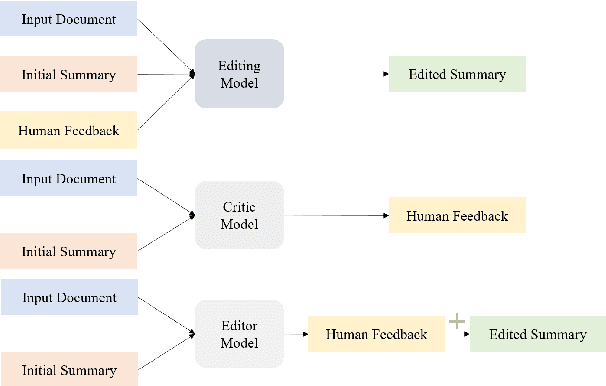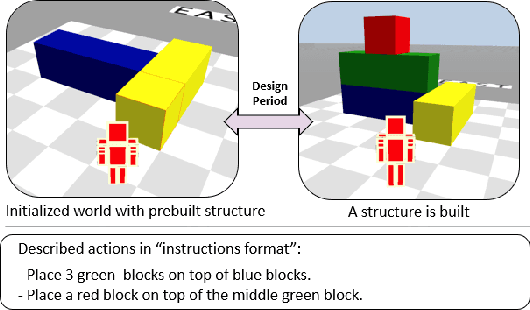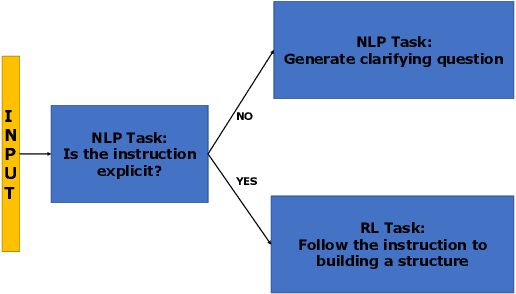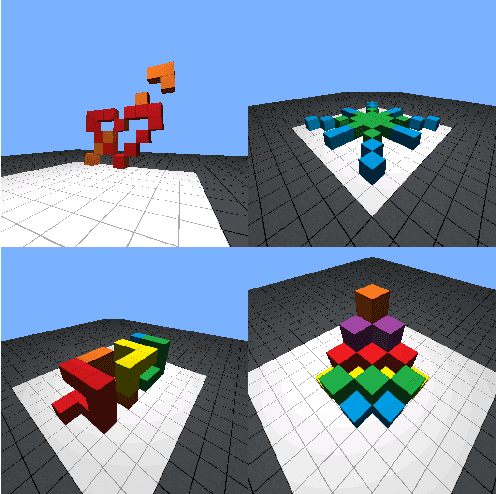Milagro Teruel
Transforming Human-Centered AI Collaboration: Redefining Embodied Agents Capabilities through Interactive Grounded Language Instructions
May 18, 2023



Abstract:Human intelligence's adaptability is remarkable, allowing us to adjust to new tasks and multi-modal environments swiftly. This skill is evident from a young age as we acquire new abilities and solve problems by imitating others or following natural language instructions. The research community is actively pursuing the development of interactive "embodied agents" that can engage in natural conversations with humans and assist them with real-world tasks. These agents must possess the ability to promptly request feedback in case communication breaks down or instructions are unclear. Additionally, they must demonstrate proficiency in learning new vocabulary specific to a given domain. In this paper, we made the following contributions: (1) a crowd-sourcing tool for collecting grounded language instructions; (2) the largest dataset of grounded language instructions; and (3) several state-of-the-art baselines. These contributions are suitable as a foundation for further research.
Improving Grounded Language Understanding in a Collaborative Environment by Interacting with Agents Through Help Feedback
Apr 21, 2023



Abstract:Many approaches to Natural Language Processing (NLP) tasks often treat them as single-step problems, where an agent receives an instruction, executes it, and is evaluated based on the final outcome. However, human language is inherently interactive, as evidenced by the back-and-forth nature of human conversations. In light of this, we posit that human-AI collaboration should also be interactive, with humans monitoring the work of AI agents and providing feedback that the agent can understand and utilize. Further, the AI agent should be able to detect when it needs additional information and proactively ask for help. Enabling this scenario would lead to more natural, efficient, and engaging human-AI collaborations. In this work, we explore these directions using the challenging task defined by the IGLU competition, an interactive grounded language understanding task in a MineCraft-like world. We explore multiple types of help players can give to the AI to guide it and analyze the impact of this help in AI behavior, resulting in performance improvements.
On Improving Summarization Factual Consistency from Natural Language Feedback
Dec 20, 2022



Abstract:Despite the recent progress in language generation models, their outputs may not always meet user expectations. In this work, we study whether informational feedback in natural language can be leveraged to improve generation quality and user preference alignment. To this end, we consider factual consistency in summarization, the quality that the summary should only contain information supported by the input documents, for user preference alignment. We collect a high-quality dataset, DeFacto, containing human demonstrations and informational feedback in natural language consisting of corrective instructions, edited summaries, and explanations with respect to the factual consistency of the summary. Using our dataset, we study two natural language generation tasks: 1) editing a summary using the human feedback, and 2) generating human feedback from the original summary. Using the two tasks, we further evaluate if models can automatically correct factual inconsistencies in generated summaries. We show that the human-edited summaries we collected are more factually consistent, and pre-trained language models can leverage our dataset to improve the factual consistency of original system-generated summaries in our proposed generation tasks. We make the DeFacto dataset publicly available at https://github.com/microsoft/DeFacto.
Collecting Interactive Multi-modal Datasets for Grounded Language Understanding
Nov 18, 2022


Abstract:Human intelligence can remarkably adapt quickly to new tasks and environments. Starting from a very young age, humans acquire new skills and learn how to solve new tasks either by imitating the behavior of others or by following provided natural language instructions. To facilitate research which can enable similar capabilities in machines, we made the following contributions (1) formalized the collaborative embodied agent using natural language task; (2) developed a tool for extensive and scalable data collection; and (3) collected the first dataset for interactive grounded language understanding.
Learning to Solve Voxel Building Embodied Tasks from Pixels and Natural Language Instructions
Nov 01, 2022Abstract:The adoption of pre-trained language models to generate action plans for embodied agents is a promising research strategy. However, execution of instructions in real or simulated environments requires verification of the feasibility of actions as well as their relevance to the completion of a goal. We propose a new method that combines a language model and reinforcement learning for the task of building objects in a Minecraft-like environment according to the natural language instructions. Our method first generates a set of consistently achievable sub-goals from the instructions and then completes associated sub-tasks with a pre-trained RL policy. The proposed method formed the RL baseline at the IGLU 2022 competition.
IGLU 2022: Interactive Grounded Language Understanding in a Collaborative Environment at NeurIPS 2022
May 27, 2022



Abstract:Human intelligence has the remarkable ability to adapt to new tasks and environments quickly. Starting from a very young age, humans acquire new skills and learn how to solve new tasks either by imitating the behavior of others or by following provided natural language instructions. To facilitate research in this direction, we propose IGLU: Interactive Grounded Language Understanding in a Collaborative Environment. The primary goal of the competition is to approach the problem of how to develop interactive embodied agents that learn to solve a task while provided with grounded natural language instructions in a collaborative environment. Understanding the complexity of the challenge, we split it into sub-tasks to make it feasible for participants. This research challenge is naturally related, but not limited, to two fields of study that are highly relevant to the NeurIPS community: Natural Language Understanding and Generation (NLU/G) and Reinforcement Learning (RL). Therefore, the suggested challenge can bring two communities together to approach one of the crucial challenges in AI. Another critical aspect of the challenge is the dedication to perform a human-in-the-loop evaluation as a final evaluation for the agents developed by contestants.
 Add to Chrome
Add to Chrome Add to Firefox
Add to Firefox Add to Edge
Add to Edge